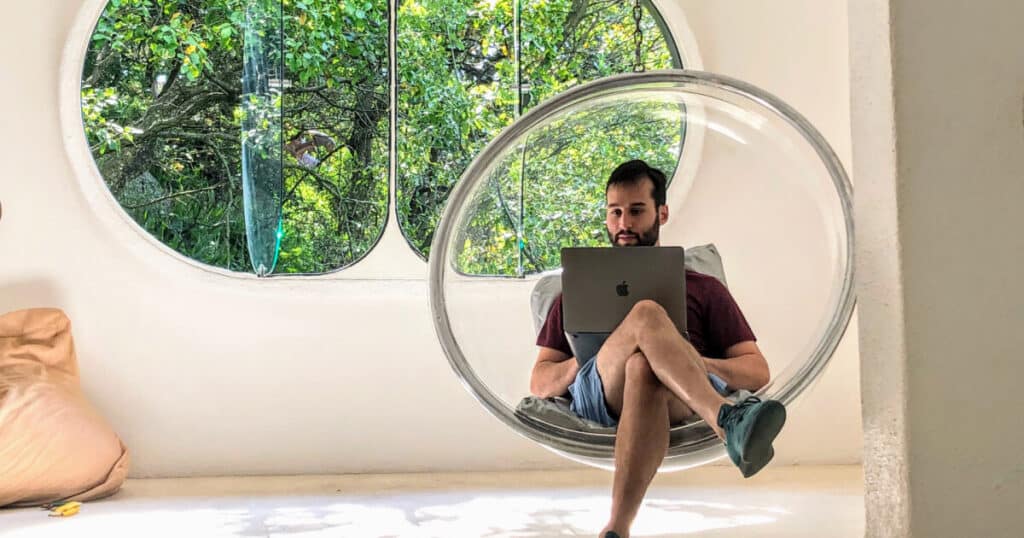Matt Rudnitsky Shows How to Become a Sportswriter & Entrepreneur


Matt Rudnitsky is an author and entrepreneur who helps people write books that fuel profitable businesses. He’s the founder of Platypus Publishing, and focuses mainly on coaching (people who want to write) and ghostwriting (for people who are too busy).
He’s written two books under his name, Smart Sports Betting and You Are An Author, one under a pseudonym (he’ll tell you after a few drinks), a dozen-ish ghostwritten … and helped dozens of people write their books.
In college, I had no idea what the hell I wanted to do with my life. Being a massive sports fan, I figured I’d try out for the school newspaper (at the University of Michigan).
I showed up for a meeting — and to my surprise, they let me cover a men’s tennis match without any sort of application process. I couldn’t believe it! Completely clueless about writing or newspaper protocols, I spent two days writing my first article, only to find out I was supposed to finish the night of the match.
My writing career had ended before even starting. Or so I thought 🙂
Fortunately, the editor gave me another chance — and I followed the protocol. I spent three years writing for the school paper, got a sports blogging internship (at SportsGrid) through a standard Google-search-plus-job-application … that turned into a (very low-paying) full-time job … which turned into my own business … and the rest was history.
My story isn’t particularly impressive or unique, but there’s a hidden lesson here. If you’re just starting out, there’s only one way to become a writer. Just start writing, and find a place that will publish your work (typically for free or very cheap). In most cases, the best way to go is just to start a blog and publish yourself.
You don’t need permission to write. Just do it. The beautiful thing is: Your first readers will be friends, colleagues, or family, so you have nothing to lose. They’ll be kind, even if you aren’t great yet.
Making a living, of course, takes more work. But until you’re actually writing and publishing regularly, everything else is irrelevant.
As I explained, my first writing job came because I was crazy enough to show up to a meeting of established writers and ask them for a chance. My second job was a simple job application — for which I created targeted writing samples (always a good idea, if you don’t have them).
As for my first decent-paying writing job (I made less than minimum wage for the school paper + sports blog) … I got it by applying to Book in a Box (now called Scribe). The application came down to a writing test.
My next few jobs came by cold email — parlaying the name recognition of Scribe for credibility. But for most jobs, I still provided targeted samples … and if needed, I created one. You can talk and talk, but the only way to guarantee you’ll get a job is to show you’ve done it before. Even if you’re just publishing on your blog, or showing them an unpublished Google Doc.
“Good writers are good readers” is a cliche because it’s 100% true. I’ve never met a great writer that isn’t an obsessive reader. It doesn’t matter what you read. It matters that you’re curious, and attuned to subtleties of your craft.
Similarly, you need to be a good listener. You need to be sensitive to the emotions and psychology of your reader — even if you’re writing something hyper-logical or scientific. Likable people are good writers because likable people know how to keep people engaged and happy.
Writing is the art of getting a stranger’s attention and taking them on a thrilling, emotional roller coaster to the destination of your choosing.
Most people don’t understand that good writing has absolutely nothing to do with grammar, sentence structure, or vocabulary. Good writing is simply: Clear, compelling communication. Everything else is noise.
If you want to dig deeper, check out my Definitive Guide: How To Write Better (281 Tips).
I’m inspired by anyone who throws their essence into their work. I don’t care if they’re writers, painters, entrepreneurs, rappers, classical musicians or tour guides — if their work is one of a kind, they’re teaching you what you need to know.
Some of my favorites (at the moment, because I’m always discovering new inspirations): Mike Posner, Labrinth, Kurt Vonnegut, James Baldwin, JR Moehringer, Joe Rogan, Seth Godin, Dave Chappelle, Chris Rock, Jerry Seinfeld, Larry David.
I’ve also visited over 50 countries and travel (seeing and hearing new perspectives) has also been insanely influential. As has my career sports betting (teaches you about volatility in life), and my wide variety of nonfiction reading (exploring disparate subjects and seeing unexpected commonalities).
No tools are essential. The only essentials are: Reading regularly, writing regularly, publishing regularly, and incorporating feedback.
That said, tools are obviously helpful, albeit interchangeable. Here’s what I’m currently using:
Make coffee. The smell gets me into “work mode” (years of conditioning).
Read for at least 15 minutes (anything by anyone I respect, so I can hijack some of their flow).
Start with a hypothesis: This is sorta what I want to say. Brain dump ideas, in no particular order. Try to turn them into a very basic outline (beginning, middle, end).
Then, try to “write drunk” the entire draft — writing all of my thoughts in rough order, without censoring. Then, “edit sober” — turn the mess into something decent, by cutting, reworking, and reading aloud to make sure it flows.

I typically listen to instrumental music while writing. Something house-y, like (current favorite: Worakls) if I want high-energy writing, something like Jazz or Classical if I want to be more chill. Words are distracting. Occasionally, I listen to a song on repeat to get further into the flow.
The only way I can stay productive is to have some sort of regular publishing habit. A small audience of people who expect to hear from me. The best way to do this is to start an email newsletter — even publishing once a month is enough to get you writing, regularly.
There’s no way to practice writing other than to write every day and publish (at least) every week. Don’t convince yourself otherwise. When in doubt, publish.
When I get stuck, I go for a walk and/or workout or stretch. When your mind gets stuck, move your body.
The best investment I ever made was paying $29/month for ConvertKit. The service itself is fine — nothing special. However, investing actual money (more than I was comfortable, at the time) was a forcing function to (nearly) guarantee that I would publish to a human audience, regularly.
Most people treat writing as a hobby, side hustle, or unsustainable career. When you start investing in your writing career, you begin to turn pro.
In the beginning, publishing regularly is the only thing that matters. Everything else — courses, books, tools, etc. — is a distraction.
By committing financially to starting an email newsletter, I felt obligated to actually do it. And once I started getting feedback (even just 1-2 replies to my early emails), I couldn’t help but continue (with a few blips, of course).
Invest in yourself. Invest in something that gets you writing more, and publishing more. You don’t need more information. You need a body of work. You need feedback. You need actual people showing you they care about your writing — so you can keep it up — or ignoring you, so you know to keep pivoting and improving.
Reading is fuel. Fuel for my curiosity, fuel for my content, fuel for my skill.
All that matters is that you follow your curiosity. Don’t think you need to read certain types of books. If you read a lot of fiction, try some nonfiction. If you read a lot of nonfiction, try some fiction. But above all, let your curiosity drive.
That said, I do recommend a few books to writers. Top 6: Nobody Wants To Read Your Sh*t, by Steven Pressfield; Deep Work, by Cal Newport; Show Your Work! and Steal Like An Artist by Austin Kleon; The Tender Bar, by JR Moehringer … and of course, You Are An Author: So Write Your Book Already, by me 🙂
“When you’re trying to create a career as a writer, a little delusional thinking goes a long way.” – Michael Lewis
“Books and ideas are antifragile and get nourishment from attacks.” – Nassim Nicholas Taleb, Antifragile
“Anything that’s not creative, society can replicate and not pay you full value for.” – Naval Ravikant, The Tim Ferriss Show
“The real writer is the one that makes you feel uncomfortable.” – George Saunders
“Just tell the interesting parts.” – Neil Strauss
“Storytelling is all about making the reader ask: What happens next?” – Brian Grazer, A Curious Mind
This is pretty much an MFA in six quotes. I just saved you $60,000! These are the keys to writing: Being crazy enough to think your thoughts matter (they do!).
Being courageous enough to say something that might not work. Being empathetic enough to see how the reader is responding, and to adjust … without pandering or sacrificing your creativity.
Step 1: Start an email newsletter.
Step 2: Start a blog.
Step 3: Start publishing at least once a month, ideally once a week or more.
Step 4: Don’t think about your “niche.” Let your curiosity lead, and adjust based on what resonates with readers.
Step 5: Start testing book ideas with your audience … in a very small, low-pressure way. (A sample part of a chapter.)
Step 6: Keep testing book ideas until it’s clear that your readers need your book. Now, you know your “niche.”
Step 7: Self-publish a book, and give that book away to as many people as possible (in exchange for email addresses).
Step 8: Sell your email list some sort of mid or high-ticket product (online course, coaching, consulting, etc.).
Step 9: Keep writing and publishing consistently. Keep repeating. Now that you know your niche, do strategic partnerships to grow your audience (find similar audiences, that you aren’t competing with … give away your book in exchange for emails).
Mistakes to avoid: Overthinking your niche before you have any readers, or developed enough skill. Waiting to start publishing (there’s never any reason to wait). Not listening to reader feedback — actively ask your audience for feedback, and turn their questions and problems into products or services. Always listen, empathize, and solve.
Focus on the intersection of your curiosity and uniqueness, and the emotional response of readers.